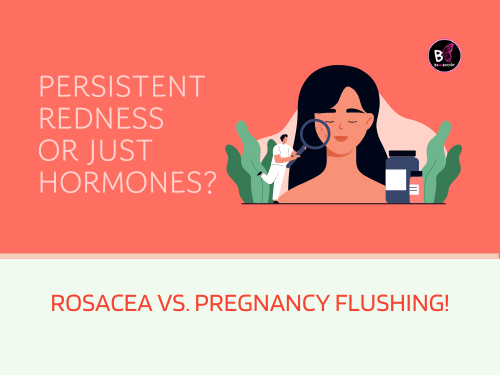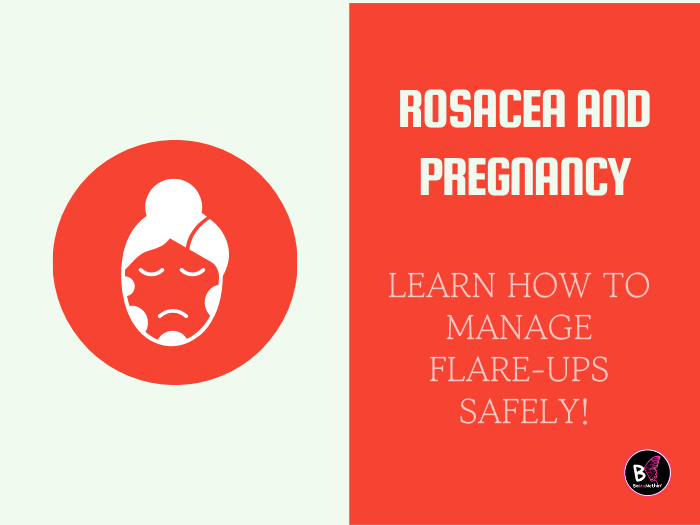Pregnancy brings many hormonal changes, some of which can worsen or improve rosacea symptoms. If you’re expecting and dealing with rosacea, you might be wondering: Will my symptoms get worse? Are treatments safe during pregnancy? What skincare should I use? This guide will explore the connection between rosacea and pregnancy, common triggers, and safe ways to manage skin flare-ups.
1. Rosacea and Pregnancy: Understanding the Connection
Rosacea is a chronic skin condition that causes redness, visible blood vessels, and bumps, primarily on the face. Hormonal shifts during pregnancy can increase skin sensitivity, making rosacea symptoms better or worse depending on the individual.
Why Does Pregnancy Affect Rosacea?
✔ Hormonal Fluctuations: Estrogen and progesterone levels rise, which can either calm or trigger flare-ups.
✔ Increased Blood Flow: Pregnancy boosts circulation, which may worsen facial redness.
✔ Oil Production: Some women experience oilier skin, leading to breakouts or irritation.
🔍 Research Insight: A 2023 study found that 48.7% of pregnant individuals with rosacea experienced worsening symptoms, while 33.3% saw no change, and 17.9% noticed improvement. This highlights the unpredictable nature of rosacea during pregnancy.
Source: medicalnewstoday.com
2. Does Rosacea Get Worse During Pregnancy?
For some women, rosacea flares up due to increased skin sensitivity and hormonal changes. Others experience temporary relief due to pregnancy-related anti-inflammatory effects.
Common Rosacea Triggers During Pregnancy:
✔ Heat & Sun Exposure – Pregnant women may feel warmer than usual, which can trigger redness.
✔ Stress & Fatigue – Increased stress levels worsen rosacea flare-ups.
✔ Dietary Changes – Spicy foods, dairy, and caffeine can trigger symptoms.
✔ Increased Oil Production – Some women develop pregnancy acne, which can irritate rosacea-prone skin.
🔍 Research Insight: Hormonal changes during pregnancy can lead to increased blood flow and oil gland activity, potentially exacerbating rosacea symptoms. A 2021 review highlights that these physiological changes may contribute to swelling and redness associated with the condition.
Source: medicalnewstoday.com
💡 Related Article: Looking for a skin-friendly pregnancy diet? Bone Broth Pregnancy: What Studies Say + 10 Powerful Benefits & How to Safely Enjoy It reveals how nutrient-rich foods can support healthy skin and reduce inflammation.
3. Treating Rosacea During Pregnancy: Safe Remedies and Skincare Tips

Many common rosacea treatments, such as retinoids and certain antibiotics, are unsafe during pregnancy. However, there are gentle alternatives that help manage symptoms.
Pregnancy-Safe Rosacea Treatments:
✔ Gentle Cleansers: Use fragrance-free, mild cleansers to avoid irritation.
✔ Hypoallergenic Moisturizers: Hydration helps reduce redness and dryness.
✔ Mineral-Based Sunscreens: Protect against UV-induced rosacea flare-ups.
✔ Cold Compresses: Applying a cool washcloth can calm inflammation.
Ingredients to Avoid During Pregnancy:
❌ Retinoids (e.g., tretinoin) – Can harm fetal development.
❌ High-dose salicylic acid – May be absorbed into the bloodstream.
❌ Certain antibiotics (e.g., doxycycline) – Not recommended during pregnancy.
🔍 Research Insight: A review in PubMed found that azithromycin is a safe oral therapy for managing rosacea in pregnancy. Topical metronidazole is also commonly used with positive results.
Source: pubmed.ncbi.nlm.nih.gov
4. Can Pregnancy Cause Facial Redness or Trigger Rosacea?

Some women who never had rosacea before pregnancy may experience facial redness due to increased blood volume and hormonal changes. However, this is not the same as rosacea.
How to Tell the Difference:
✔ Rosacea: Persistent redness, visible blood vessels, sensitivity, and bumps that look like acne.
✔ Pregnancy-Related Redness: Temporary flushes of heat, common in the third trimester.
What to Do If Pregnancy Causes Facial Redness:
✔ Use cooling mists and aloe vera to calm skin.
✔ Avoid spicy foods and hot showers to reduce redness.
✔ Wear mineral sunscreen daily to protect sensitive skin.
💡 Related Article: Concerned about safe skin treatments while pregnant? 11 Eye-Opening Facts About Mammogram During Pregnancy – What Research Reveals discusses pregnancy-safe medical procedures, helping you confidently navigate skincare and health screenings.
5. Postpartum Rosacea: Will My Skin Return to Normal After Pregnancy?
After giving birth, hormone levels fluctuate, which can lead to rosacea flare-ups or improvements. Some women see their symptoms fade, while others experience new or worsened breakouts.
How to Manage Postpartum Rosacea:
✔ Continue using gentle skincare products.
✔ Watch for new triggers (stress, breastfeeding, lack of sleep).
✔ If rosacea worsens, consult a dermatologist for post-pregnancy treatment options.
💡 Related Article: Are you struggling with post-pregnancy body changes? Hernia After Pregnancy: 12 Crucial Facts Every New Mom Should Know explores how pregnancy affects your body and what to watch for if you experience discomfort beyond rosacea.
6. The Biggest Triggers for Rosacea During Pregnancy
Avoiding common triggers can reduce flare-ups and help maintain skin health.
| Trigger | Why It Worsens Rosacea | How to Avoid It |
| Spicy Foods | Increases blood flow, causing redness | Eat milder meals |
| Hot Beverages | Heat expands blood vessels | Opt for iced drinks |
| Sun Exposure | UV rays worsen inflammation | Wear SPF 30+ sunscreen |
| Stress & Lack of Sleep | Triggers flare-ups | Practice meditation & deep breathing |
7. Can Breastfeeding Affect Rosacea?

Breastfeeding affects hormones and inflammation, which may worsen or improve rosacea symptoms. Some women experience dry, irritated skin, while others notice clearer skin postpartum.
Safe Rosacea Treatments While Breastfeeding:
✔ Gentle, fragrance-free cleansers and moisturizers
✔ Zinc-based sunscreens
✔ Laser therapy (only if cleared by a doctor)
🔍 Research Insight: A case report suggests that 5% permethrin cream may be a safe and affordable rosacea treatment for breastfeeding women. However, further studies are needed.
Source: pubmed.ncbi.nlm.nih.gov
8. Natural and Medical Treatments for Rosacea: What Works Best?
Rosacea Treatment: Help Clear Redness Naturally in 7 Steps
Many women prefer natural remedies during pregnancy and breastfeeding. Here’s how they compare:
| Treatment | Effectiveness | Safe During Pregnancy? |
| Cold Compresses | Soothes inflammation | ✅ Yes |
| Aloe Vera Gel | Hydrates & calms redness | ✅ Yes |
| Azithromycin (oral antibiotic) | Reduces rosacea symptoms | ✅ Yes |
| Laser Therapy | Treats redness | ⚠️ Consult doctor |
🔍 Research Insight: Light-based therapies, such as specific laser treatments, may be safe and effective for managing rosacea during pregnancy. However, it’s crucial to consult with a dermatologist to determine the safety and suitability of specific laser treatments during this period.
Source: contemporaryobgyn.net
9. Is Rosacea Linked to Hormonal Imbalances Like PCOS?
Rosacea is often linked to hormonal changes, including PCOS (Polycystic Ovary Syndrome). PCOS causes high androgen levels, which can increase oil production and worsen rosacea symptoms.
How to Manage Rosacea with Hormonal Imbalances:
✔ Limit dairy and sugar to reduce inflammation.
✔ Use gentle skincare to avoid irritation.
✔ Consider hormone-regulating treatments (only under medical supervision).
💡 Related Article: Struggling with hormonal imbalances like PCOS and noticing flare-ups in your rosacea? Discover how managing PCOS can not only support clearer skin but also promote a healthy pregnancy in How to Avoid a Miscarriage with PCOS: 10 Proven Strategies for a Healthy Pregnancy. Learn essential tips to balance hormones and protect both your skin and your baby’s well-being.
FAQ Section: Addressing Common Concerns About Rosacea and Pregnancy
Q1: Can pregnancy cause rosacea or make it worse?
Yes, hormonal changes can trigger flare-ups or improve symptoms.
Q2: What are safe treatments for rosacea during pregnancy?
Use gentle skincare, cold compresses, and pregnancy-safe moisturizers.
Q3: Will rosacea go away after pregnancy?
Some women see improvement postpartum, while others experience lingering flare-ups.
Q4: Can a baby be born with rosacea?
No, rosacea is not a condition present at birth. However, genetics play a role, and a child may develop rosacea later in life.
Q5: What triggers rosacea flare-ups during pregnancy?
Common triggers include spicy foods, hot drinks, stress, heat, sun exposure, and certain skincare products.
Q6: Can birth control help manage rosacea symptoms?
Some women find that hormonal birth control improves their rosacea, while others experience worsening symptoms. It depends on individual hormonal responses.
Q7: Is rosacea linked to PCOS or other hormonal imbalances?
Yes, rosacea is sometimes associated with PCOS due to its connection to hormonal fluctuations and inflammation.
Conclusion: Managing Rosacea During Pregnancy and Beyond
Hormonal shifts, increased blood flow and heightened skin sensitivity make rosacea flare-ups common during pregnancy. However, with the right approach, symptoms can be managed effectively. Gentle skincare routines, avoiding known triggers, and staying hydrated can help maintain skin balance. If symptoms worsen, consulting a dermatologist ensures safe and effective treatment options. By adopting a proactive skincare routine and making mindful lifestyle choices, expecting and new mothers can control rosacea while prioritizing skin health and overall well-being.



